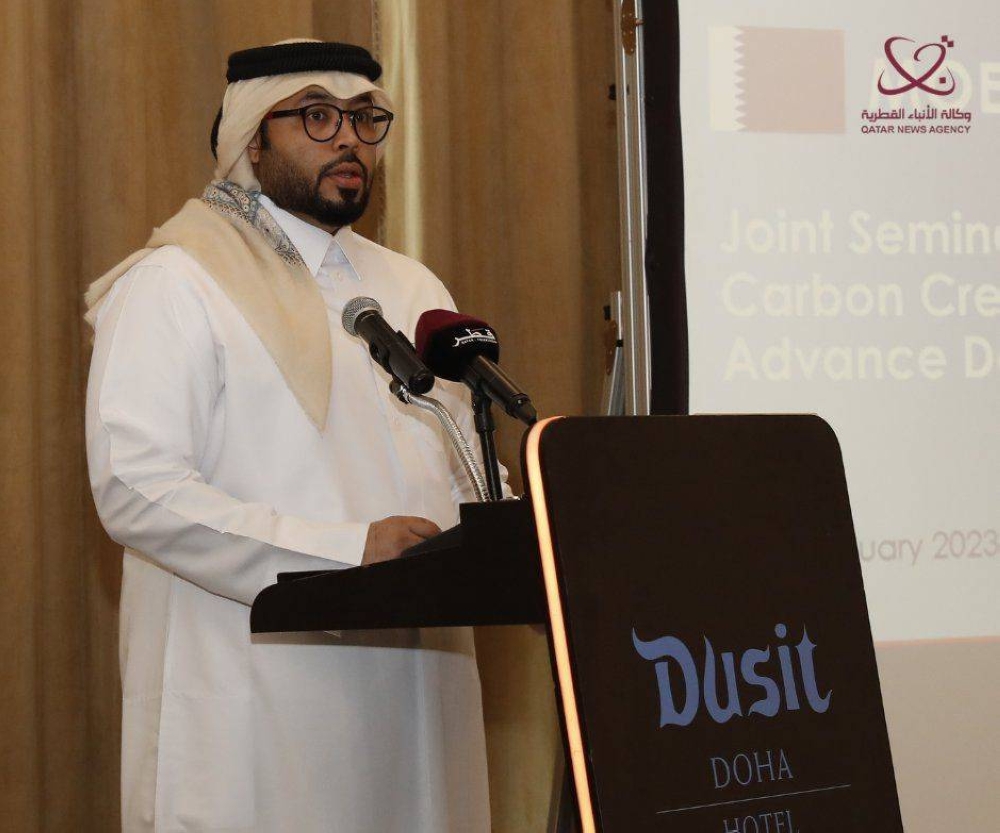QNA
Doha
Qatar’s national plan for climate change aims to reduce greenhouse gas emissions by 25 percent through the country’s many initiatives being currently implemented, such as fostering energy efficiency, operating renewable energy plants and introducing carbon capture and storage technologies, said Acting Director of the Climate Change Department at the Ministry of Environment and Climate Change (MoECC) Saad Abdullah Al Hitmi.
Speaking at a symposium entitled ‘Carbon Credits’ organised by the ministry, in cooperation with the Japanese Ministry of Economy, Trade and Industry and attended by Minister of Environment and Climate Change HE Sheikh Dr Faleh bin Nasser bin Ahmed bin Ali Al Thani, on Tuesday, Hitmi said Qatar seeks to use carbon credits through international cooperation, including the exchange of knowledge and technology transfer.
“Based on these efforts, the MoECC, in cooperation with the Japanese Ministry of Economy, Trade and Industry, is holding this symposium with a focus on the role of carbon credits in achieving emissions reduction globally, by discussing the energy transition, the latest carbon credits developments, including Article 6 of the Paris Climate Agreement, the Joint Crediting Mechanism and the Voluntary Carbon Credits,” he said.
“Among the objectives of the symposium are raising awareness about the use of carbon credits to achieve a carbon-free society and exchanging knowledge about carbon credits, the latest carbon removal technologies and joint carbo credits case studies,” he added.
Hitmi said that Article 6 of the Paris Agreement would enhance carbon transactions among governments, especially with the article allowing countries to exchange carbon credits through bilateral agreements to reduce emissions abroad and enabling entities other than governments to do the same in voluntary carbon markets.
The use of carbon credits under Article 6 recently attracted the interest of many countries, he said, expecting further carbon credits expansion in the near future.
He pointed out that voluntary carbon markets are an important solution to achieving carbon neutrality in companies that fall under the umbrella of compulsory emissions trading.
Hitmi said that carbon offsets are financial tools issued by project developers to avoid or remove greenhouse gas emissions from the atmosphere, while voluntary carbon credits allow emitters to compensate for their inevitable emissions by purchasing carbon credits issued by projects aimed at removing or reducing greenhouse gas emissions.
The FIFA World Cup Qatar 2022 was the first carbon-neutral tournament in the FIFA history, he noted.
The projects that provide advanced carbon removal technologies through the joint credit mechanism will lead to strengthening bilateral cooperation between Qatar and Japan in this field, Al Hitmi added.
This symposium was preset through great efforts and joint cooperation between the MOECC, the Japanese Ministry of Economy, Trade and Industry, and the Mitsubishi Research Institute, which supports the Japanese Ministry of Economy, Trade and Industry in developing technological cooperation projects in partner countries.



